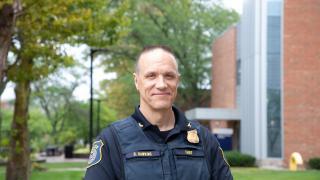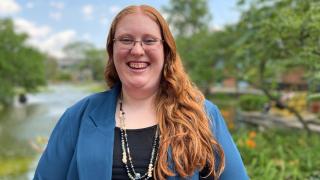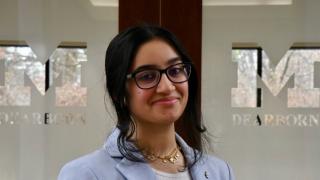
It’s important to provide education and support to students, faculty and staff about worldwide health and human rights concerns like sexual violence, relationship violence and stalking.
UM-Dearborn is listed as one of Michigan’s safest public universities in rankings from sites like stateuniversity.com and, for transparency, an annual campus report shares instances of sexual misconduct brought to the attention of the university and the response. Center for Social Justice and Inclusion Director Shareia Carter says it is important to stay vigilant, transparent and prioritize safety, while also expanding sexual violence prevention efforts and providing dedicated support for survivors.
So Carter — along with Sociology Professor Pamela Aronson, Dean of Students Amy Finley, Public Safety Director and Chief of Police Gary Gorski, and Office for Institutional Equity Director Pamela Heatlie — worked together to secure a large federal grant from the Department of Justice (DOJ) to expand campus educational initiatives and support to sexual assault, relationship violence and stalking survivors.
The DOJ’s Office on Violence Against Women recently awarded UM-Dearborn $300,000 over three years to hire a fulltime staff member to be a campus-based support person for survivors, to oversee the online education for incoming students, and to begin an in-person prevention education program specifically designed for our campus’ unique population of commuters and non-traditional students, as well as programming for faculty and staff. The grant proposal also includes a formal partnership with local nonprofit First Step to offer a 24/7 helpline for campus and more.
“We know that members of our community experience sexual and relationship violence and we continue to work to provide needed support, resources and options,” Finley says. “We are deeply committed to educating people on what this violence looks like, steps to take when you encounter this violence, and to let people know that there is a designated person on campus you can go to when you need support.”
Campus is currently in the hiring process for the director; the plan is to have the staff member in place during the Winter 2021 semester.
Heatlie says the new position will work closely with many campus offices and departments like the Department of Police and Public Safety and Counseling and Psychological Services. She says faculty and staff will continue their efforts to keep campus a safe place for all — but now there will be a centralized person dedicated to supporting sexual violence survivors and developing educational programs.
“This person will support the entire campus community — students, faculty and staff,” Heatlie says. “Meaningful support coming from a person who is trained in this area and responds in a caring and informative manner gives us a greater chance as an institution to help survivors stay engaged and involved with this campus.”
Aronson, whose research focuses on the transition to adulthood, says having a director will also give faculty members a point person to give when students share personal situations that include unhealthy relationship behaviors and/or relationship violence.
“We know there are organizations that can help, but students need a person who is nearby and trusted,” she says. “It’s really important to give students holistic support as they work toward their educational goals.”
Carter says the grant was a collaborative effort from many around campus — and she looks forward to continuing the conversation around sexual assault, stalking and relationship violence through future workshops, speaker panels and prevention education efforts.
“This grant is major for our campus. It’s taking a good effort on addressing these concerns and turning it into a great one. It allows us to expand what we have been doing and create intentional and engaging learning experiences that are right for our campus community.”




